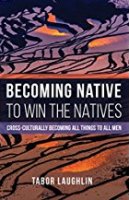For new missionaries, Tabor Laughlin’s Becoming Native to Win the Natives is a must read. His book has the rare combination of being practical, relevant and readable. Although a short text (just under 70 pages), Laughlin’s work is packed with counsel that only comes from years of experience.
Section One addresses issues related to one’s perspective and heart. In the second part, Laughlin talks about matters that every missionary faces. These include language learning, assimilating into the local culture, one’s appearance in the local community, and managing family life. Finally, he ties it all together in a concise conclusion.
Laughlin’s book is practical without becoming overly pragmatic. He specifically addresses the daily tasks that make up the missionary life. He equips and encourages readers with realistic expectations. Laughlin gives no space to idealism or abstraction. Instead, one finds advice that is immediately actionable. His stories draw from personal experience and so demonstrate what it might look like to “become native."
Having served many years in China, Laughlin is able to offer counsel that is relevant to missionaries in every context. By contrast, other authors settle for mere principles in order to reach a maximum audience. Laughlin concludes his chapters with multiple questions that guide readers in application. These questions stimulate personal reflection and will direct missionaries as they consider the practical steps they need to take in order to flourish in their ministry. I envision many veteran missionaries also using Laughlin’s book to train, encourage, and mobilize newer workers.
One of the most enjoyable aspects of the book is its readability. Given its short length, the book is a quick read. Laughlin writes in simple prose. He does not include a lot of technical terms and concepts that would otherwise confuse readers unfamiliar with missiological jargon. His tone is conversational and his message is clear.
Some might complain about the book’s brevity. I, for one, tend to steer away from such short works. Laughlin certainly could have said much more. However, he has spent much of a decade training newcomers to the mission field. As a result, his aim is simple: to write a brief text that people will actually read amid the stress of transition, language learning, and culture shock. In fact, readers will find more substance in this resource than is often found in much larger works.
I heartily recommend Laughlin’s book for anyone who wants to become native to win the natives.
